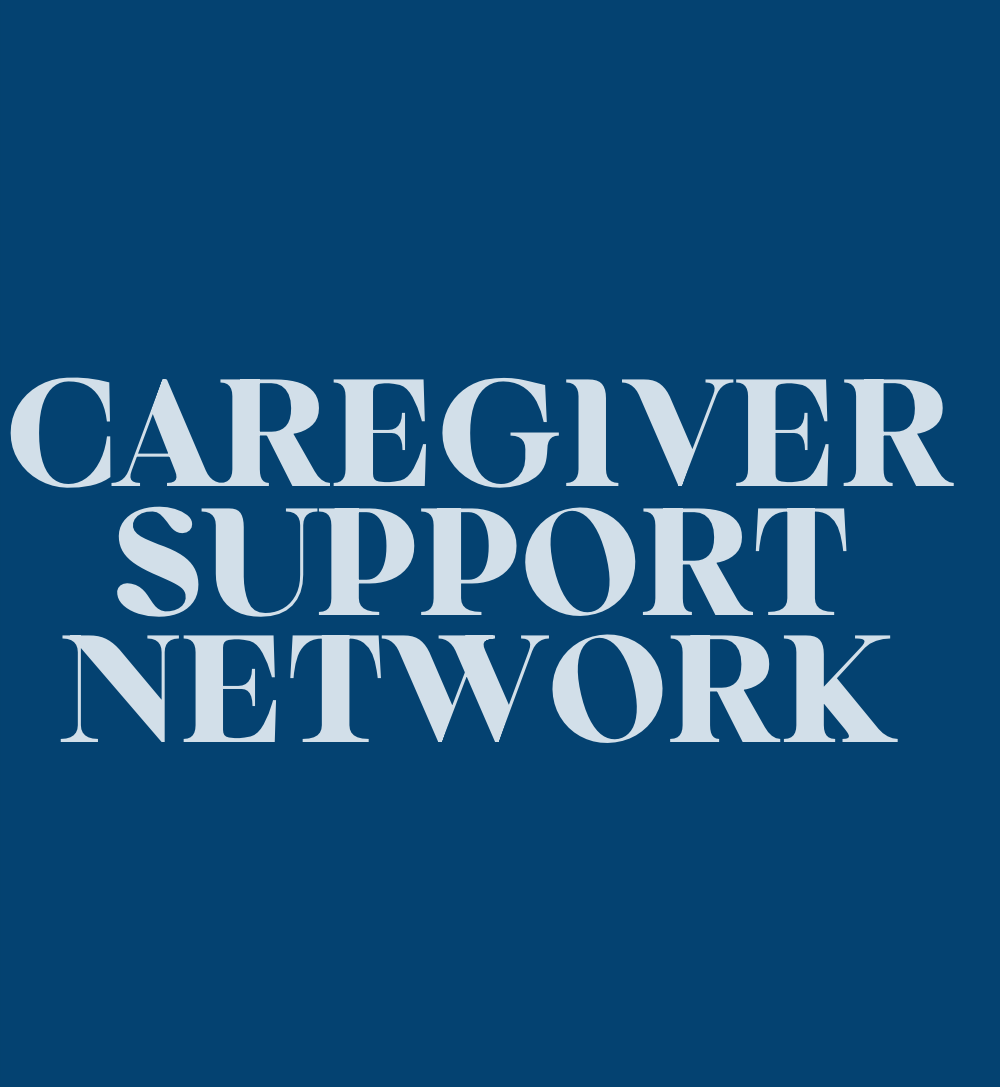Activities
Supporting our elders: Tips for Care and Compassion

Aging is a universal process that affects us all. In the United States, the elderly population is on a swift rise. Did you know forecasts indicate that there will be over 78 million seniors by 2030? As the number of older adults keeps climbing, the importance of providing elder care assistance and support is likewise increasing.
Key Takeaways:
- Understanding the unique needs of geriatric patients is essential for providing competent and compassionate care.
- Creating a comfortable and supportive environment can greatly enhance the well-being of elderly patients.
- Empowering seniors in their own care by involving them in decision-making can improve their sense of control and satisfaction.
- Social connection and emotional support play a vital role in combating loneliness and promoting the overall well-being of seniors.
- Valuing the wisdom and life experiences of our elders fosters intergenerational learning and strengthens family bonds.
Meeting the Needs of Geriatric Patients
When caring for geriatric patients, we must understand and address their unique needs and challenges. Many seniors experience cognitive and sensory deficits, which can include confusion, disorientation, and impaired hearing and vision. By acknowledging and assessing these deficits, we can provide competent and compassionate care that meets the specific needs of elderly patients.
Geriatric care requires a comprehensive understanding of the cognitive deficits commonly found in this population. These deficits can manifest as memory loss, difficulty with decision-making, and challenges with problem-solving. It is essential to approach geriatric care with patience and understanding, tailoring our interactions and interventions to support individuals with cognitive impairments.
In addition to cognitive deficits, many geriatric patients also experience sensory deficits. This can include changes in hearing and vision, making it challenging for them to communicate effectively or understand instructions. By using clear and concise language, ensuring proper lighting and visual aids, and providing assistive devices when necessary, we can help overcome these barriers and ensure effective communication.
“Understanding the unique needs of geriatric patients and tailoring our care to address these needs is crucial in providing compassionate and effective healthcare.”
A Holistic Approach to Geriatric Care
Caring for geriatric patients goes beyond addressing their cognitive and sensory deficits. It requires a holistic approach that considers their physical, emotional, and social well-being. By adopting a person-centered care approach, healthcare providers can create a supportive environment that promotes overall well-being and quality of life for elderly patients.
In order to provide compassionate care, it is essential to establish rapport and build trust with geriatric patients. Taking the time to listen to their concerns, engaging in meaningful conversations, and respecting their autonomy can help foster a sense of empowerment and dignity. By involving them in their care decisions and actively seeking their input, we can ensure that their preferences and values are respected.
To ensure the safety and comfort of geriatric patients, healthcare environments should be designed to address their specific needs. This can include signage and visual cues to aid in wayfinding, ensuring accessibility for mobility aids, and implementing fall prevention strategies. The physical environment should be conducive to promoting independence and reducing the risk of accidents or injuries.
Supporting Geriatric Patients Through Compassionate Care
Compassionate care is the foundation of providing holistic and effective support for geriatric patients. It involves demonstrating empathy, patience, and understanding while considering their unique needs. Compassionate care encompasses not only addressing their medical conditions but also attending to their emotional well-being and promoting social connections.
By fostering a sense of empathy and understanding, healthcare providers can create a safe and nurturing environment for geriatric patients. This can involve active listening, validating their emotions, and providing emotional support during challenging times. Building meaningful connections and offering a shoulder to lean on can greatly improve their overall experience and well-being.
| Cognitive Deficits | Sensory Deficits | Compassionate Care |
|---|---|---|
|
|
|
Enhancing Comfort and Communication
Creating a comfortable and supportive environment is crucial for elderly patients. When it comes to the patient environment, small changes can make a big difference. Harsh lighting and loud noises can exacerbate anxiety or agitation, so it’s important to create a calm and soothing atmosphere. By manipulating the environment to reduce distractions and increase comfort, healthcare providers can help promote a sense of calmness.
One way to enhance the patient environment is through sensory stimulation. Providing gentle background music or introducing pleasant scents can create a soothing ambiance that promotes relaxation and well-being. Consider using nature sounds or calming music to create a peaceful atmosphere in patient rooms or common areas.
“Creating a calm and soothing environment can significantly impact the well-being of our elderly patients. By reducing distractions and introducing sensory stimulation, we can promote a sense of calmness and comfort.”
In addition to the physical environment, effective communication is essential for patient engagement and promoting a positive patient experience. Taking the time to engage in conversations and actively listen to patients can foster a meaningful connection. Encourage patients to share their concerns, thoughts, and preferences, and demonstrate genuine interest and empathy.
Using open-ended questions and allowing patients to express themselves can help healthcare providers better understand their needs and preferences. This fosters a sense of empowerment and engagement, as patients feel heard and valued.
Remember, effective communication isn’t just about what’s being said, but also about non-verbal cues. Maintaining eye contact, using a calm and reassuring tone, and displaying empathy through body language can all contribute to effective patient-provider communication and patient engagement.
Enhancing Comfort and Communication Checklist:
- Create a calm and soothing environment by reducing distractions and introducing sensory stimulation.
- Consider using background music or pleasant scents to enhance the patient environment.
- Engage in conversations and actively listen to patients to foster a meaningful connection.
- Encourage patients to express their concerns, thoughts, and preferences.
- Use open-ended questions and demonstrate empathy to better understand patients’ needs.
- Pay attention to non-verbal cues and display empathy through body language.
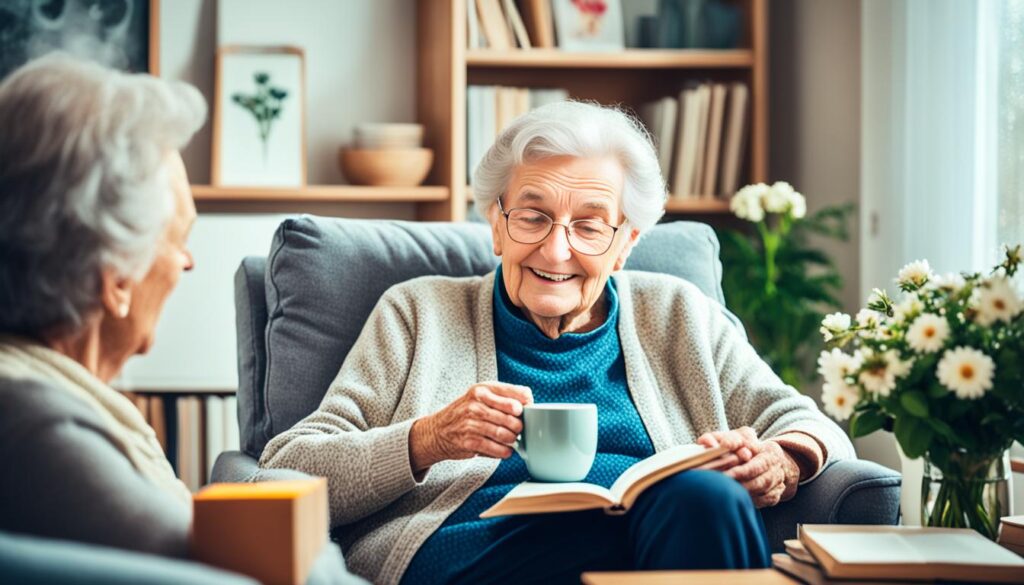
By prioritizing the patient environment and effective communication, healthcare providers can create a supportive and engaging experience for elderly patients. These strategies promote comfort, foster a stronger patient-provider relationship, and ultimately enhance the overall well-being of our beloved seniors.
Empowering Seniors in their Care
Many elderly patients express a strong desire to be actively involved in their own care. At [Healthcare Organization Name], we believe in patient empowerment and strive to provide seniors with the knowledge and resources they need to take an active role in managing their health.
One of the key ways we empower seniors is through patient education. Our nurses are dedicated to providing comprehensive information about their diagnosis and treatment plans. By equipping seniors with this knowledge, we enable them to make informed decisions and actively participate in their healthcare journey.
When seniors feel involved in their care, it promotes a sense of ownership and control over their health. We encourage open communication and collaboration, ensuring that seniors have the opportunity to ask questions and voice their concerns. By including them in the decision-making process, we respect their autonomy and empower them to make choices that align with their values and preferences.
“Our goal is to make seniors feel heard and valued as partners in their care,” says [Nurse’s Name], a registered nurse at [Healthcare Organization Name].
“It’s truly rewarding to witness the transformation that occurs when seniors become active participants in their healthcare. They gain confidence, become more engaged in managing their conditions, and ultimately experience improved outcomes.”
To further support patient involvement, we also provide educational materials, such as pamphlets and brochures, to reinforce important healthcare information. Additionally, our healthcare professionals are committed to clear and jargon-free communication, ensuring that seniors understand their medical conditions and treatment plans.
By empowering seniors in their care, we aim to improve their overall well-being and quality of life. When seniors feel empowered, they are more likely to adhere to treatment protocols, take proactive steps in disease prevention, and actively seek out resources to support their health.
Benefits of Empowering Seniors in their Care
- Increased sense of control and agency
- Improved communication between seniors and healthcare providers
- Enhanced understanding of medical conditions and treatment plans
- Higher adherence to treatment protocols
- Increased engagement in disease prevention
- Improved health outcomes and overall well-being
When seniors are empowered in their care, they become active partners in their health journey. By fostering patient education, involvement, and empowerment, we can achieve better outcomes and create a more patient-centered approach to elder healthcare.
| Ways to Empower Seniors in their Care | Benefits |
|---|---|
| Provide comprehensive patient education | Enhanced understanding of medical conditions and treatment plans |
| Encourage active participation in decision-making | Increased sense of control and improved treatment outcomes |
| Offer clear and jargon-free communication | Better understanding of healthcare information |
| Supply educational materials for reinforcement | Improved retention of important healthcare information |
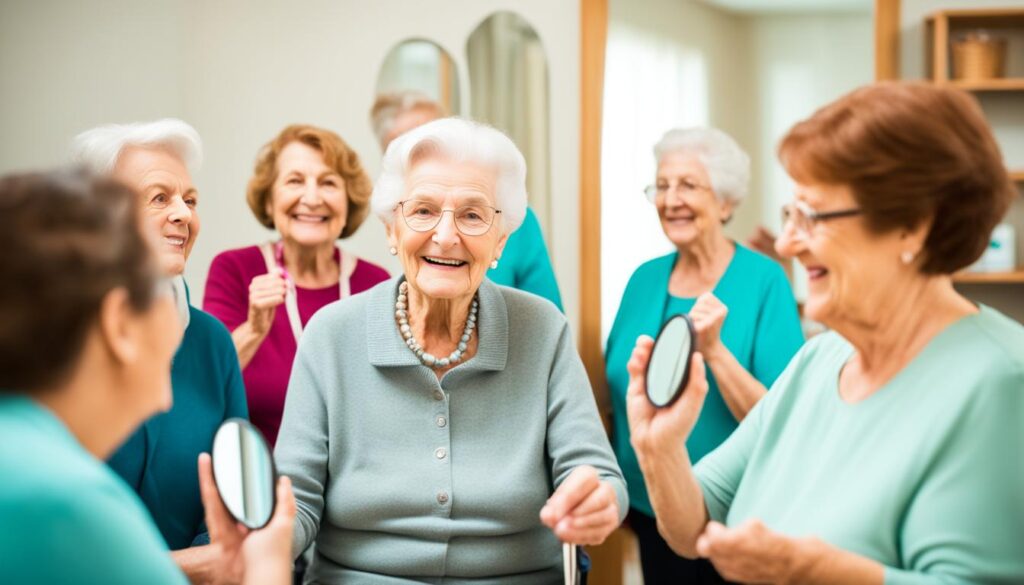
The Importance of Quality Time and Emotional Support
Loneliness and isolation are common issues affecting the elderly population. As seniors age, they may find themselves facing changes in social connections and experiencing a sense of disconnection from the world around them. This can greatly impact their emotional well-being. To counteract these feelings, it is crucial for us to prioritize spending quality time with our elders and providing them with the emotional support they need.
By engaging in meaningful activities and positive conversations with our loved ones, we can combat the detrimental effects of loneliness in seniors. Sharing stories, memories, and laughter not only helps create a warm and joyful atmosphere but also fosters a sense of belonging and connection.
“The simplest acts, like listening attentively or sharing a meal together, can go a long way in making our elders feel valued, heard, and loved.” – Anonymous
Being present for our loved ones is essential. Taking the time to visit, call, or video chat regularly shows our elders that they are cherished and not forgotten. Through these interactions, we can provide emotional support by lending a sympathetic ear, offering encouragement, and expressing our love and appreciation. These acts of kindness contribute greatly to the overall well-being of our seniors.
Image:

Research has shown that social connection plays a vital role in promoting emotional well-being among the elderly. By facilitating opportunities for social interaction, such as organizing family gatherings, inviting friends over, or encouraging participation in community activities, we can help our elders build and maintain meaningful relationships. These connections not only alleviate loneliness but also provide a support system that contributes to improved mental and emotional health.
In conclusion, recognizing and addressing the issue of loneliness in seniors is crucial for their overall well-being. By prioritizing quality time and emotional support, we can create a nurturing environment that combats feelings of isolation and promotes a sense of belonging. Our elders deserve to feel valued, loved, and connected, and it is each of our responsibilities to make that a reality.
Valuing the Wisdom of our Elders
Our elders possess a wealth of wisdom and life experiences. It is essential to value and appreciate their advice, as their insights can offer valuable lessons. By actively listening and respecting their knowledge, we foster intergenerational learning and create stronger bonds with our elders.
“Respecting the wisdom of our elders is not only a sign of appreciation but also an acknowledgment of their lifelong experiences. Listening to their advice can provide us with invaluable guidance and help us navigate our own journeys.”
Through their years of living, our elders have amassed a remarkable collection of knowledge and understanding. They have witnessed the world evolve and overcome numerous challenges. Their stories serve as a window into the past, offering us glimpses of history and imparting lessons we can learn from.
Creating a culture of respect and appreciation for our elders allows for intergenerational learning to thrive. By actively engaging with them and valuing their contributions, we promote a sense of belonging and inclusion. This exchange of knowledge not only benefits us but also enriches the lives of our elders, fostering a sense of purpose and continued growth.
Gaining Wisdom from Advice
When we seek advice from our elders, we demonstrate humility and recognize the value of their lived experiences. Their guidance can shed light on various aspects of life, including relationships, career choices, and personal growth. By following their advice, we can avoid pitfalls and make more informed decisions.
Listening attentively to the stories and insights shared by our elders allows us to gain a deeper understanding of ourselves and the world around us. Their perspectives provide invaluable perspectives, often rooted in a different era. This intergenerational exchange not only enhances our knowledge but also fosters empathy and understanding between generations.
Learning from Lifetime Experiences
A lifetime of experiences shapes the wisdom our elders have acquired. Their journeys are a tapestry of joys, sorrows, accomplishments, and lessons learned. By recognizing the value of these experiences, we open ourselves to a wealth of knowledge that can guide us through our own challenges.
Actively seeking out the stories and experiences of our elders allows us to tap into their reservoir of knowledge. From overcoming adversity to embracing change, the insights gained from their lifetime experiences provide us with inspiration and guidance. Their wisdom serves as a compass, helping us navigate the complexities of life with greater clarity and purpose.
Intergenerational Learning for Stronger Bonds
The process of intergenerational learning not only benefits us individually but also strengthens the bonds between generations. By engaging with our elders and showing a genuine interest in their lives, we bridge the gap between different eras and foster connections based on mutual respect and understanding.
Through intergenerational learning, we create a sense of unity and shared purpose. By acknowledging the wisdom and knowledge of our elders, we honor their contributions and affirm the significance of their role in society. This acknowledgment helps create an inclusive and supportive environment where everyone feels valued and appreciated.
In conclusion, valuing the wisdom of our elders is an integral part of fostering intergenerational learning. By actively listening, respecting their advice, and learning from their lifetime experiences, we not only gain valuable insights but also strengthen the bonds between generations. Let us cherish and appreciate the knowledge and wisdom our elders possess, for it is through their guidance that we can navigate our own paths with greater clarity and purpose.
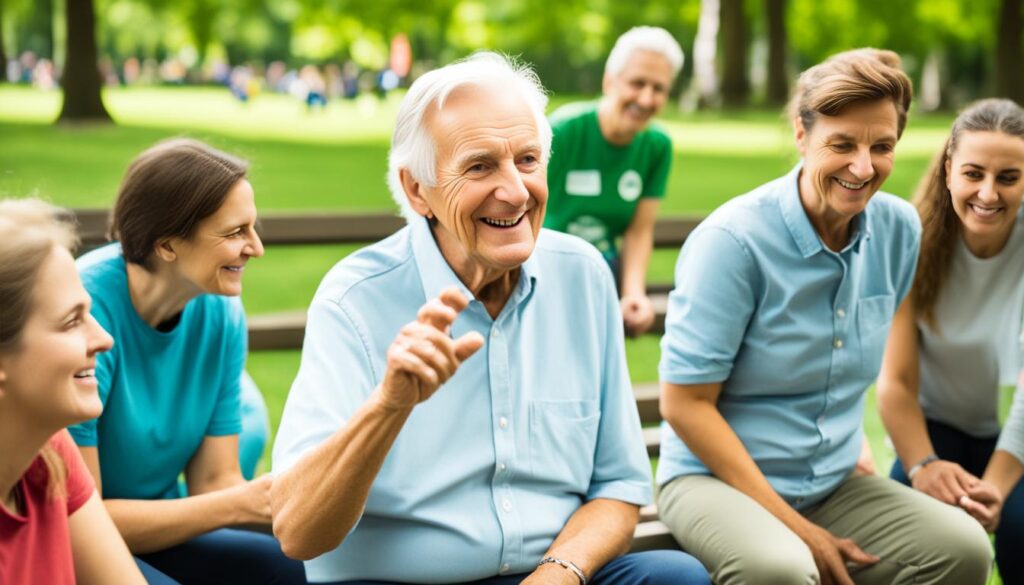
Nurturing Family Bonds and Traditions
In our fast-paced world, family time and maintaining traditions have become increasingly important, especially for seniors. These moments allow us to connect with our loved ones on a deeper level and create lasting memories. One of the best ways to foster togetherness and strengthen generational connections is through shared meals.
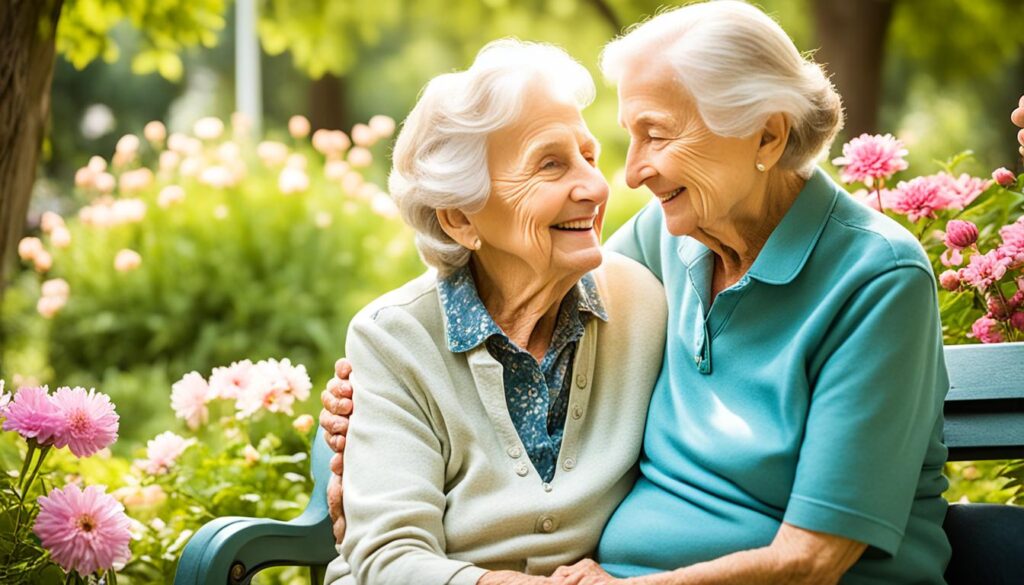
Eating meals together not only provides nourishment for our bodies but also feeds our souls. It’s a time when we can gather around the table, put away distractions, and truly be present with each other. Whether it’s a home-cooked feast, a simple picnic, or a special celebration, these shared meals create a sense of belonging and unity.
“Food is the ingredient that binds us together as a family.” – Unknown
During these shared meals, stories are shared, laughter fills the air, and bonds are strengthened. It’s an opportunity to pass down family recipes, teach younger generations about cultural traditions, and learn about our shared history. The intergenerational exchange of knowledge and experiences enriches everyone involved.
“Traditions are not, indeed, inherited but are born of love and nurtured by generations.” – Unknown
To further enhance the generational connection, engaging in activities that reflect our family traditions is essential. Whether it’s playing board games, participating in annual family outings, or carrying out special rituals, these shared experiences create a sense of continuity and identity.
“Traditions touch us, they connect us, and they color our lives.” – Sherri Miller
Generations Table: A Celebration of Family Traditions
| Tradition | Description |
|---|---|
| Annual Family Reunion | Each year, our extended family gathers for a reunion to celebrate our shared heritage and catch up with one another. |
| Sunday Brunch | Every Sunday, we have brunch together, enjoying a variety of dishes and engaging in meaningful conversations. |
| Holiday Baking Day | During the holiday season, we come together to bake traditional family recipes, ensuring these delicacies continue to be enjoyed by future generations. |
| Family Game Night | Once a month, we gather for a fun-filled game night, where laughter and friendly competition bring us closer. |
| Memory Scrapbooking | We maintain a family scrapbook, where everyone contributes their favorite memories and photos to create a visual representation of our shared experiences. |
No matter the size or complexity of the tradition, what truly matters is the love and connection it fosters. By nurturing family bonds and traditions, we create a sense of belonging and a support system that will carry us through life’s highs and lows.
Embracing Technology for Elderly Support
In today’s digital age, we understand the importance of teaching our elders how to navigate technology. By providing guidance and support in learning digital skills, we can greatly enhance the lives of senior citizens.
Learning digital skills allows our elders to stay connected with family and friends, even if they are physically distant. Through video calls, messaging apps, and social media platforms, they can maintain meaningful relationships and participate in important life events. The ability to see and hear loved ones virtually can bring immense joy and reduce feelings of isolation.
Additionally, technology provides access to a wealth of helpful resources. Senior citizens can explore online learning platforms to expand their knowledge, engage in virtual communities to pursue hobbies and interests, and utilize digital tools for managing their own health. From medication reminders to telehealth appointments, technology offers convenience and empowerment in healthcare management.
“Being able to connect with my children and grandchildren through video calls has brought so much happiness into my life. Technology has truly bridged the distance between us.” – Elizabeth Thompson, 78
Staying Connected and Independent
Embracing technology empowers seniors to stay independent and engaged in the digital world. With the right digital skills, they can navigate online shopping platforms, access e-books and audiobooks, and even manage their finances through secure online banking. These capabilities enhance their quality of life and reduce reliance on others for daily tasks.
Moreover, technological assistance can improve safety and security for elderly individuals. From wearable devices that track health metrics and provide emergency alerts to smart home systems that enhance accessibility and comfort, technology offers innovative solutions to support the unique needs of seniors.
Building Digital Skills
Building digital skills may seem daunting to some seniors, but with patience, encouragement, and proper guidance, they can overcome any initial hesitation. It’s crucial to create a supportive learning environment where seniors feel comfortable exploring technology at their own pace.
Local community centers, libraries, and senior centers often offer digital literacy programs specifically designed for seniors. These programs provide step-by-step training on basic computer skills, internet navigation, and popular applications. Additionally, family members can play an active role in teaching their elders how to use smartphones, tablets, and other devices.
- Start with basic functions such as making and answering calls, sending messages, and taking photos.
- Gradually introduce more advanced features, such as using video calling apps and social media.
- Encourage seniors to practice regularly, offering assistance and answering any questions that arise.
- Highlight the benefits of technology and the endless possibilities it offers in staying connected with the world.
- Remain patient and understanding throughout the learning process.
Empowering our elders with digital skills not only enhances their lives but also strengthens intergenerational connections. By bridging the technology gap, we can ensure that seniors feel included and valued in our increasingly digital society. Let’s embrace technology for elderly support and empower our seniors to thrive in the digital age.
Grandchildren and Intergenerational Bonding
Building strong bonds with grandchildren can bring immeasurable joy and fulfillment to seniors. The presence of grandchildren can boost their energy levels, reduce feelings of loneliness, and enhance social connections. Encouraging intergenerational bonding can have a positive impact on the mental and emotional well-being of our elders.
“Having my grandkids around fills my heart with so much love and happiness. They bring light and laughter into my life, and spending time with them truly rejuvenates me. It’s like a breath of fresh air that reminds me of the beauty of life.”
Research has shown that intergenerational interactions can have numerous benefits for both grandparents and grandchildren. It provides an opportunity for the older generation to share their wisdom, stories, and life experiences, fostering a sense of purpose and fulfillment. In return, grandchildren gain a sense of security, love, and guidance from their grandparents.
Spending quality time together creates a meaningful connection that strengthens family ties. Grandparents can impart valuable life lessons, traditions, and values to their grandchildren, instilling a sense of identity and belonging. This exchange of knowledge and love contributes to the overall well-being of both generations.
Activities for Bonding with Grandchildren
Here are some activities that can help foster bonding and create cherished memories with grandchildren:
- Take a nature walk or visit a park together
- Share favorite books, stories, or movies
- Bake cookies or prepare a family recipe
- Engage in arts and crafts projects
- Play board games or card games
- Explore hobbies and interests together
By engaging in these activities and making time for grandchildren, we not only create lasting memories but also provide a sense of stability and love that contributes to their overall development. The bonds formed during these moments become treasured connections that bring joy and emotional well-being to both grandparents and grandchildren.
| Benefits of Intergenerational Bonding |
|---|
| Enhanced emotional well-being for both grandparents and grandchildren |
| Reduced feelings of loneliness and social isolation |
| Preservation of family traditions and values |
| Transfer of wisdom, life experiences, and knowledge |
| Increased sense of purpose and fulfillment for grandparents |
| Strengthened family ties and intergenerational relationships |
Grandchildren are not just a source of joy for grandparents but also play a vital role in their emotional well-being. As we actively foster intergenerational bonding, we create an environment of love, support, and connection that benefits the entire family.
Seeking Professional Caregiving Services
As seniors age, they may reach a point where they require additional support and care. At this stage, opting for professional caregiving services becomes a valuable option. With elder care services, such as in-home care, seniors can receive personalized assistance and companionship in the comfort of their own homes. This allows them to age in place while maintaining their independence and receiving the care they need.
In-home care services cater to the specific needs of each individual, ensuring that they receive the personalized care they deserve. Caregivers are trained professionals who provide a range of services, including personal care assistance, medication management, meal preparation, and companionship. With their expertise and compassionate approach, caregivers offer support and peace of mind to both seniors and their families.
By opting for in-home care, seniors can benefit from a familiar environment that promotes comfort and stability. The personalized nature of these services means that caregivers can adapt to the unique preferences and routines of each senior, ensuring a sense of continuity and familiarity. This personalized approach enhances the overall well-being of seniors and contributes to their quality of life.
One of the key advantages of in-home care is the companionship it offers. For many seniors, loneliness and isolation can be significant challenges. Having a caregiver present provides much-needed social interaction and emotional support. Caregivers develop meaningful relationships with seniors, engaging in conversations, and participating in activities that contribute to their emotional well-being.
“In-home care services provide personalized assistance, meaningful companionship, and the comfort of aging in place.”
Furthermore, in-home care services offer flexibility and can be tailored to meet changing needs. Caregivers can adjust their schedule and level of support, ensuring that seniors receive the assistance they require at any given time. Whether it’s temporary assistance during recovery or long-term care, in-home care services can adapt to the evolving needs of seniors.
When seeking professional caregiving services, it is crucial to select a reputable and trusted provider. Researching different agencies, reading reviews, and requesting references can help make an informed decision. It is also important to communicate openly and regularly with the chosen caregiver to ensure alignment in expectations and goals.
Benefits of In-Home Care Services
In-home care services offer numerous benefits for seniors. Here are some key advantages:
- Personalized assistance tailored to individual needs
- Companionship and emotional support
- Familiarity and comfort of aging in place
- Flexibility to adapt to changing needs
- Peace of mind for both seniors and their families
A Sample Comparison of In-home Care Services
| Services | In-Home Care Service A | In-Home Care Service B | In-Home Care Service C |
|---|---|---|---|
| Personalized care plans | ✓ | ✓ | ✓ |
| 24/7 availability | ✓ | ✓ | |
| Medication management | ✓ | ✓ | |
| Meal preparation | ✓ | ✓ | |
| Companionship | ✓ | ✓ |
Note: This is just a sample comparison table and does not represent specific providers or services.
Choosing professional caregiving services, such as in-home care, allows seniors to receive the personalized care and companionship they deserve, ensuring they can age gracefully while maintaining their independence. With the support of compassionate caregivers, seniors can enjoy a higher quality of life while receiving the care they need.
Cultivating Empathy in Caregiving Careers
Empathy is a crucial skill for those pursuing a career in caregiving. As caregivers, it is our responsibility to understand and connect with the seniors we serve on a deep emotional level. Empathy allows us to put ourselves in their shoes, enabling us to provide compassionate and supportive care that meets their unique needs.
Learning to empathize with seniors is a skill that can be developed and honed through empathy training programs. These training programs help caregivers recognize and understand the emotional experiences of seniors, equipping us with the tools and knowledge needed to deliver personalized care.
“Empathy bridges the gap between caregiver and senior, fostering trust, understanding, and a sense of security.”
When we cultivate empathy in our caregiving careers, we create a nurturing environment where seniors feel valued, heard, and respected. By actively listening to their concerns, offering comfort in times of distress, and providing a genuine human connection, we instill a sense of compassion that goes beyond the physical care we provide.
Benefits of Cultivating Empathy:
- Increased trust and rapport with seniors
- Enhanced communication and understanding
- Improved emotional well-being for both caregiver and senior
- Reduced feelings of isolation and loneliness in seniors
- Promotion of a positive caregiving relationship
By taking the time to cultivate empathy in our caregiving careers, we can make a meaningful difference in the lives of the seniors we serve. Empathy allows us to connect with them on a deeper level, fostering a sense of trust, security, and companionship.
Conclusion
Supporting and caring for our elders is a responsibility that should not be taken lightly. As our aging population grows, it becomes increasingly important to provide the care and support that our seniors deserve. By implementing the tips and strategies outlined in this article, we can make a positive difference in the lives of our elders.
Whether it’s spending quality time with them, actively listening to their stories, or embracing technology to help them stay connected, we have the ability to empower and uplift our aging population. It is through our compassion and respect that we can truly make a difference.
Let’s come together as a community and prioritize the well-being of our elders. By caring for the elderly and supporting our elders, we ensure that they are able to age with dignity and live fulfilling lives. Together, let’s create a society that values and cherishes our seniors.
There are several ways you can support our elders. You can spend quality time with them, actively listen and engage in positive conversations, value their wisdom and life experiences, and involve them in decision-making regarding their healthcare. Additionally, you can help them learn and navigate technology, build strong bonds with grandchildren, and consider professional caregiving services if needed.
Elder support services can include in-home care, assisted living facilities, senior activity centers, and transportation services for seniors. These services provide personalized assistance, companionship, and care to help seniors maintain their independence and well-being.
One way to help seniors who are feeling lonely or isolated is to spend quality time with them. Engage in meaningful conversations, actively listen, and participate in activities that promote generational connections. Additionally, encourage their involvement in community events or senior activity centers to help them build social connections and combat feelings of loneliness. To support elderly individuals in their healthcare journey, you can empower them by providing information about their diagnosis and treatment plan. Involve them in decision-making regarding their care and ensure they have the opportunity to ask questions and express their preferences. By actively involving seniors in their care, you can help them feel more in control and empowered.
To improve the environment for elderly patients, consider reducing harsh lighting and loud noises that can cause anxiety or agitation. Create a calm and comfortable space by manipulating the environment to reduce distractions. This can help promote a sense of calmness and well-being for elderly patients.
Technology can play a significant role in supporting the elderly. Teaching our elders how to navigate technology can help them stay connected with family and friends, access helpful resources, and manage their own health. Embracing technology can empower seniors and increase their independence.
FAQ
How can I support our elders?
What are some elder support services available?
How can I help seniors who are feeling lonely or isolated?
What can I do to support elderly individuals in their healthcare journey?
How can I improve the environment for elderly patients?
What role does technology play in supporting the elderly?
Activities
Aromatherapy and Dementia: Unlocking the Potential of Essential Oils in Cognitive Care
Hover over the fragrant world of essential oils as we delve into their mysterious link with cognitive function in dementia – a captivating journey awaits.

Stepping into the realm of cognitive therapy, the enticing scent of essential oils draws us closer to a potential breakthrough in dementia care.
The intricate dance between aromatherapy and cognitive function holds secrets waiting to be unveiled, offering a glimpse into a world where the power of scent could hold the key to enhancing memory and emotional well-being in those affected by dementia.
The subtle yet profound impact of essential oils on the mind hints at a path worth exploring further, promising a unique approach to supporting cognitive health in individuals facing memory challenges.
Key Takeaways
- Olfactory sense linked to limbic system aids cognitive care.
- Lavender and lemon balm oils offer cognitive benefits in dementia.
- Aromatherapy with essential oils shows promise in slowing cognitive decline.
- Safe use and proper dilution essential for effective aromatherapy in dementia care.
The Science of Aromatherapy in Dementia
As experienced caregivers, we've witnessed firsthand the profound impact of aromatherapy on cognitive functions in individuals with dementia. The olfactory sense plays a vital role in aromatherapy, as it's intricately linked to the limbic system, the part of the brain responsible for emotions, behavior, and long-term memory. In dementia care, where cognitive decline is a significant challenge, harnessing the power of aromatherapy with essential oils like lavender and lemon balm can be transformative. Research indicates that olfactory enrichment through these essential oils can positively influence cognitive skills, potentially slowing down cognitive impairment in conditions like Alzheimer's disease.
The direct connection between the olfactory sense and the brain makes aromatherapy a valuable tool in addressing cognitive decline. Studies have shown that essential oil interventions have a tangible impact on enhancing cognitive functioning in dementia patients. By stimulating the olfactory system, aromatherapy has the potential to improve memory, cognitive skills, and even sleep quality in individuals struggling with cognitive impairments. This scientific understanding underscores the significance of incorporating aromatherapy into dementia care practices.
Key Benefits of Essential Oils

The therapeutic benefits of essential oils for individuals with dementia encompass a range of key advantages, from promoting better sleep to enhancing cognitive performance. When considering the well-being of dementia patients, the use of essential oils like lavender and lemon balm can offer significant benefits:
- Improved Sleep: Lavender oil, known for its calming properties, can help in promoting better sleep quality for individuals experiencing restlessness or sleep disturbances due to dementia-related issues.
- Enhanced Cognitive Performance: Lemon essential oils have shown promise in boosting cognitive performance, potentially aiding in improving memory and cognitive functions in dementia patients.
- Olfactory Sense Stimulation: Utilizing essential oils not only provides therapeutic benefits but also stimulates the olfactory senses, which can have beneficial effects on cognitive decline and overall well-being.
Aromatherapy Applications in Cognitive Care
In our practice, we've found that the strategic application of various essential oils, such as rosemary, lemon, lavender, and orange, plays a crucial role in enhancing cognitive function for individuals with dementia. Aromatherapy is a powerful tool in cognitive care, with diffusers being commonly used to disperse these essential oils for maximum benefits.
Additionally, the topical application of oils on skin, temples, or pulse points offers longer-lasting effects, promoting improved cognitive function over time. When facing cognitive challenges, essential oils like peppermint and basil can be particularly helpful in boosting focus and concentration through aromatherapy practices.
Moreover, creating customized blends with oils such as lavender, chamomile, and frankincense can effectively reduce stress and anxiety in individuals with dementia, providing a holistic approach to cognitive care. By incorporating these tailored aromatherapy techniques into daily routines, we can support cognitive function and enhance the overall well-being of those we care for.
Essential Oils for Memory Enhancement

Transitioning from our exploration of aromatherapy applications in cognitive care, we now focus on the significant role essential oils play in memory enhancement. Essential oils have shown promising results in improving cognitive function, especially in older adults dealing with memory-related issues such as dementia.
When it comes to memory enhancement, different essential oil odorants offer unique benefits:
- Rosemary Essential Oil: Known for its ability to enhance memory, mental clarity, and alertness, rosemary essential oil can be a powerful tool in boosting cognitive function and improving memory recall.
- Lemon Essential Oil: With its energizing properties, lemon essential oil increases energy levels and uplifts mood, providing a cognitive boost that can aid in memory retention and cognitive performance.
- Peppermint Essential Oil: Boosting focus, concentration, and mental alertness, peppermint essential oil can help improve cognitive performance and enhance memory retention in individuals looking to sharpen their mental acuity.
Safety Guidelines for Aromatherapy
Prior to engaging in aromatherapy practices, it's essential to adhere to safety guidelines to ensure a positive and risk-free experience. Essential oils should always be diluted before use to prevent skin irritation or adverse reactions. Performing a patch test before applying essential oils is crucial to confirm no allergic reactions occur. It's important to keep essential oils out of reach of children and pets to prevent accidental ingestion, which can be harmful. For pregnant women, consulting with a healthcare provider before using essential oils is recommended, as some oils may not be safe during pregnancy.
When storing essential oils, it's best to use dark glass bottles and keep them away from direct sunlight. This helps preserve their potency and prevents degradation over time. By following these safety guidelines, you can enjoy the benefits of aromatherapy while ensuring the well-being of yourself and those around you.
Frequently Asked Questions
How Does Aromatherapy Help Dementia Patients?
Aromatherapy helps dementia patients by stimulating olfactory receptors tied to emotional regulation. Essential oils like lavender, bergamot, and lemon balm can calm patients and reduce aggression. This therapy enhances cognitive function and memory in those with dementia.
Certain oils alleviate anxiety and depression symptoms. Its popularity is growing as a complementary treatment for dementia, showing promise in cognitive care.
What Essential Oils Are Good for Cognitive Impairment?
When we consider essential oils for cognitive impairment, we find rosemary, peppermint, lavender, and lemon stand out.
Each oil offers unique benefits: rosemary boosts memory, peppermint aids concentration, lavender reduces stress, and lemon uplifts mood.
These qualities can greatly enhance cognitive function in those facing challenges.
The power of these essential oils lies in their ability to address cognitive impairments effectively, offering hope and support for individuals seeking improved mental clarity.
What Are 3 Things to Never Do With Your Loved One With Dementia?
When caring for a loved one with dementia, it's crucial to avoid disagreements, rushing them, and making sudden changes in routine. These actions can lead to frustration, stress, and confusion.
Instead, we aim to provide a calm and consistent environment, validate their emotions, and offer support. By focusing on patience, empathy, and stability, we can enhance their quality of life and strengthen our connection with them.
What Is the Number One Trigger for Dementia Behavior?
When it comes to dementia behavior, the number one trigger is often environmental factors. Loud noises, unfamiliar surroundings, changes in routine, or disruptions in familiar settings can all lead to challenging behaviors in individuals with dementia.
Understanding and minimizing these environmental triggers is crucial for managing the well-being of those affected. Creating a calm and familiar environment can help reduce agitation and confusion, improving the quality of life for individuals with dementia.
Conclusion
In conclusion, essential oils have shown great potential in improving cognitive function and emotional well-being for individuals with dementia. By incorporating aromatherapy into cognitive care strategies, we can unlock the power of scent to stimulate memory, enhance focus, and promote relaxation.
Remember, when it comes to caring for loved ones with dementia, sometimes the simplest solutions can have the biggest impact. So why not give aromatherapy a try and see if it's the missing piece of the puzzle?
Albert brings a wealth of knowledge and expertise to our writing team. With a background in caregiving and a deep understanding of the challenges faced by caregivers, Albert’s writing resonates with authenticity and empathy. He is committed to delivering high-quality content that empowers and supports caregivers on their journey.
Activities
Family Tree Research – What’s In Your Family Genealogy?
Intrigued by the secrets hidden in your family tree? Discover the fascinating world of genealogy and uncover your unique heritage.

We understand that delving into your family tree can seem daunting, especially with the vast amount of information out there. However, searching through your ancestry can reveal fascinating discoveries that connect you to your roots in unexpected ways.
From uncovering long-lost relatives to understanding the cultural heritage that shaped your family, exploring your genealogy can provide a sense of identity and belonging that transcends generations. So, why not take the first step and embark on this journey of self-discovery through your family tree research?
Key Takeaways
- Gather vital info systematically from family for comprehensive family tree.
- Utilize essential records like death certificates, census for detailed genealogy.
- Explore census, city directories for family insights, movements, connections.
- Connect with genealogical societies for networking, resources, preservation efforts.
Starting Your Family Tree Research
To embark on your journey of family genealogy research, we must first delve into the foundational steps of starting your family tree research. Begin by gathering vital information about yourself, your parents, and grandparents. Record and organize details about your ancestors systematically to lay a strong groundwork for your family tree. Key elements such as names, dates, places, and relationships are crucial in identifying individuals in historical records. Understanding the significance of names, event dates, locations, and family connections is essential for constructing an accurate family tree.
Home resources like family documents, bibles, certificates, diaries, and photographs are invaluable for gathering essential data. These personal items can provide valuable insights and details that may not be available in public records. Utilizing these resources can uncover hidden gems of information about your ancestors that can enrich your family history research. Remember, by starting with what you know and gradually working backward, you can piece together a comprehensive picture of your family's lineage.
Essential Records for Genealogy

Embarking on our exploration of family genealogy research, we now turn our focus to the critical foundation provided by essential records for tracing and documenting our lineage. These essential records serve as the backbone of our family tree, offering invaluable insights into our ancestors' lives. Here are three key types of records crucial for genealogical research:
- Death Certificates: Death certificates provide vital information such as the date and cause of death, which can lead to discovering burial locations, next of kin, and sometimes even birthplaces.
- Federal Census Records: Census records are a treasure trove of details, offering a snapshot of our ancestors' lives every ten years, including names, ages, occupations, relationships, and addresses.
- Land Records: Land records not only reveal property ownership but also provide clues about migration patterns, economic status, and community connections that can enrich our understanding of our family history.
Delving into archives for these essential records can uncover fascinating details and help piece together the puzzle of our lineage.
Exploring Census and City Directories
Exploring Census and City Directories reveals a wealth of historical data crucial for understanding our ancestors' lives and societal connections. Census records, archived in the National Archives, provide a detailed snapshot of our family members' lives every decade in the United States. These records offer insights into family structures, demographics, occupations, and residential locations, enabling genealogists to track changes over time.
City directories complement census records by showcasing residents' addresses, businesses, and occupations, painting a vivid picture of urban life and community dynamics. By utilizing both census records and city directories in genealogical research, we can piece together a comprehensive understanding of our ancestors' lives within the societal contexts of their time. These resources not only help us trace family members' movements and connections but also shed light on the broader historical landscape in which they lived, enriching our appreciation for the past.
Utilizing Libraries and Archives

Libraries and archives provide a treasure trove of compiled family histories and local records essential for in-depth genealogical research. When delving into your family history, consider the following key points:
- Access to Courthouse Records: Libraries and archives offer a wealth of courthouse records such as wills, probate documents, land records, and deeds. These original documents can unveil vital information about your ancestors' lives and possessions.
- City Directories: Make use of city directories available in libraries to discover details about your ancestors' residences, occupations, and even business endeavors. These directories can provide insights into the daily lives of your relatives.
- State Archives Resources: State archives often house a plethora of valuable records beyond vital statistics. By exploring these archives, you can uncover family stories, track movements through state census records, and access a variety of original documents crucial for expanding your family tree research.
Connecting With Genealogical Societies
Engaging with genealogical societies enhances research depth and fosters collaboration with seasoned experts in the field. By joining these societies, individuals gain access to valuable networking opportunities, educational materials, and exclusive resources for delving into their family history. Members can attend workshops, conferences, and events tailored to genealogy research, expanding their knowledge and honing their research skills. Genealogical societies also play a crucial role in preservation efforts, supporting digitization projects and promoting genealogical research for the benefit of future generations.
| Benefits of Connecting with Genealogical Societies | |
|---|---|
| Networking Opportunities | Gain connections with fellow researchers and experts |
| Educational Materials | Access exclusive resources and databases for research |
| Preservation Efforts | Support digitization projects and research promotion |
| Future Generations | Contribute to the preservation of family history for future genealogists |
Frequently Asked Questions
How Do I Research My Family Genealogy?
When researching our family genealogy, we start by gathering vital information about immediate family members. We record names, dates, and places for previous generations.
Online platforms like Ancestry.com and FamilySearch.org are valuable resources. Preserving and scanning family photos can provide genealogical insights.
It's important to keep detailed records of sources and cross-check information for accuracy. This thorough approach helps us uncover our family history effectively.
What Is Included in Genealogy?
When exploring genealogy, one discovers a rich tapestry of family history woven through generations. Births, marriages, deaths, and occupations of our ancestors are meticulously documented.
Unraveling family connections and migrations reveals a captivating narrative of our past. Cultural heritage, traditions, and customs passed down offer insight into our roots.
Through genealogy, we gain a profound understanding of our heritage, connecting us to the stories of those who came before us.
How Can I Find My Genealogy for Free?
To find your genealogy for free, we recommend utilizing online platforms like FamilySearch.org and Ancestry.com. These sites offer valuable resources and databases. Additionally, USGenWeb.org and FindAGrave.com provide free options for research. Stay cautious of document accuracy on such sites.
Take advantage of free access during holidays and explore various platforms regardless of religious affiliation. Access to research databases is widely available online.
How to Pass on Research What to Include in Your Genealogy Will?
When passing on research in our genealogy will, we include vital documents, family narratives, and contact info for key resources. This ensures future generations can continue our work.
Organizing materials in a clear and accessible manner is crucial. Preservation of our research findings aids in maintaining our family's history.
Conclusion
In conclusion, delving into our family genealogy is like unraveling a complex tapestry of interconnected stories and relationships. By piecing together vital records, exploring historical documents, and connecting with genealogical societies, we gain a deeper understanding of our lineage and heritage.
Just as a skilled historian uncovers hidden truths in ancient manuscripts, we too can uncover the rich history of our ancestors through diligent research and exploration.
Albert brings a wealth of knowledge and expertise to our writing team. With a background in caregiving and a deep understanding of the challenges faced by caregivers, Albert’s writing resonates with authenticity and empathy. He is committed to delivering high-quality content that empowers and supports caregivers on their journey.
Activities
Taking a Trip Down Memory Lane: Crafting a DVD for Your Loved One With Dementia
Embark on a nostalgic journey like no other by crafting a DVD for your loved one with dementia – a heartfelt gesture that bridges past and present, igniting precious memories and emotions.
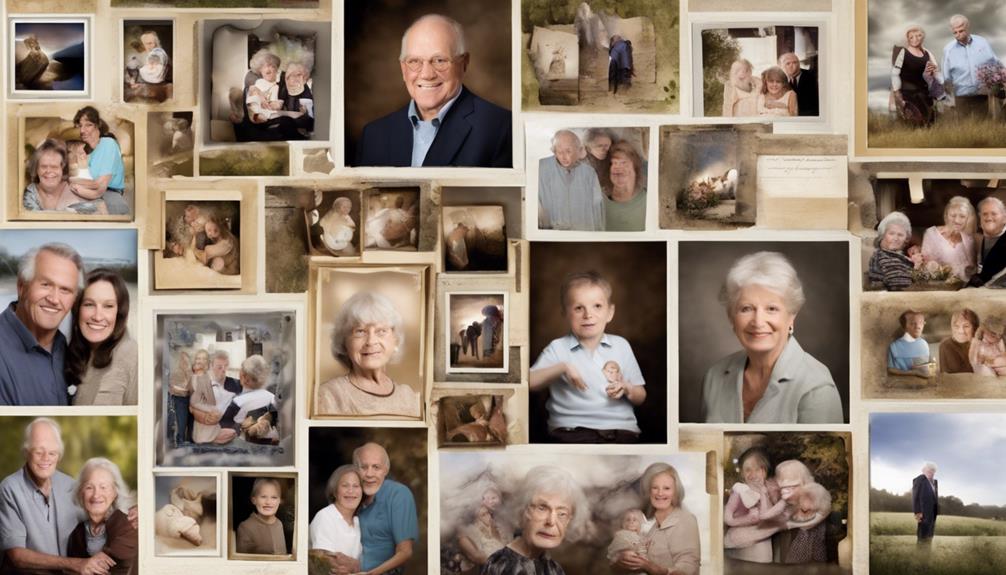
Making a DVD for a loved one affected by dementia could serve as the most significant way to encapsulate an entire lifetime’s worth of memories into a single, tangible object.
As we dive into the intricacies of selecting the perfect photos and songs, you'll discover how this personalized journey down memory lane can bridge the gap between past and present, igniting moments of recognition and joy.
Stay tuned to unravel the secrets of creating a heartfelt DVD that not only preserves cherished moments but also fosters a deeper connection with your loved one, sparking conversations and evoking emotions that transcend time.
Key Takeaways
- Nostalgia therapy benefits Alzheimer's and dementia patients.
- Create a cozy, distraction-free space for viewing.
- Select content that reflects cherished memories.
- Engage in activities triggering memories for comfort and connection.
The Power of Nostalgia
When creating a DVD for a loved one with dementia, tapping into the power of nostalgia can evoke cherished memories and emotions, providing comfort and connection. Memories from the past hold a special place in our hearts, and for individuals with dementia, these memories can be a source of joy and familiarity. Engaging in activities that trigger these memories can help bridge the gap between the past and the present, allowing your loved one to reminisce about happier times.
Dementia can often make it challenging for individuals to recall recent events, but memories from years gone by tend to remain intact. By incorporating old pictures, music, and storytelling into the DVD, you can create a treasure trove of nostalgia that brings comfort and happiness to your loved one. Nostalgia therapy has shown remarkable benefits for Alzheimer's and dementia patients, helping them feel more at ease and connected to their identity. So, as you craft this DVD, remember the power of nostalgia in unlocking precious memories and emotions for your loved one.
Step-by-Step Guide
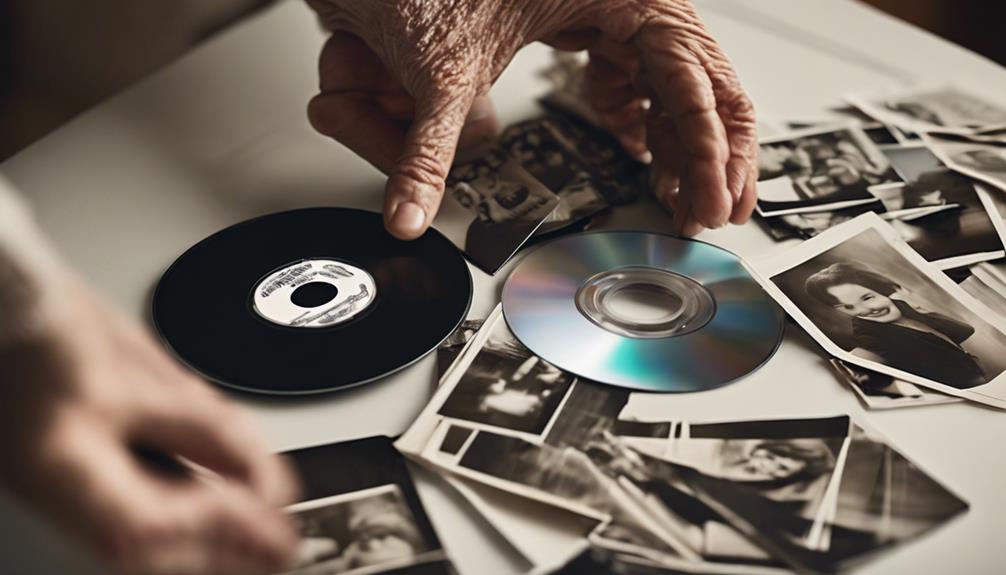
As we embark on the journey of creating a memory DVD for a loved one with dementia, our first crucial step is gathering photographs and videos to capture cherished moments and create a meaningful experience. This process can be emotional, so remember to take breaks and care for yourself throughout.
Here are some tips to guide you through this journey:
- Handle Memories with Care: Treat each photograph and video clip as a precious memory, honoring the stories they hold.
- Embrace Emotions: Allow yourself to feel the nostalgia and love that come with revisiting these moments.
- Create a Safe Space: Set up a cozy, quiet area where you can immerse yourself in the memories without distractions.
- Celebrate Every Moment: Recognize the importance of this activity in connecting with your loved one and creating lasting memories.
Each step you take in this process is a meaningful activity, not just for your loved one but also for you. Embrace the journey down memory lane with compassion and dedication.
Choosing the Right Content
To curate a memory DVD that resonates deeply with your loved one with dementia, carefully selecting photos and videos that hold significant sentimental value is essential. When choosing the right content, focus on incorporating images and videos that reflect past events and cherished memories shared with loved ones. These visuals can serve as powerful triggers, taking your loved one on a heartfelt journey back in time. Including moments from family gatherings, special occasions, and vacations can evoke a sense of nostalgia and connection to their past.
Additionally, integrating music that's meaningful to your loved one can enhance the emotional impact of the DVD. Songs that resonate with their past experiences and emotions can help create a comforting and familiar atmosphere. Organize the content in a coherent manner, either chronologically or thematically, to weave a compelling narrative that guides them through the journey of 'Taking a Trip' down memory lane. By carefully selecting content that's engaging, positive, and tailored to their preferences, you can ensure a truly meaningful viewing experience for your loved one.
Personalizing the DVD
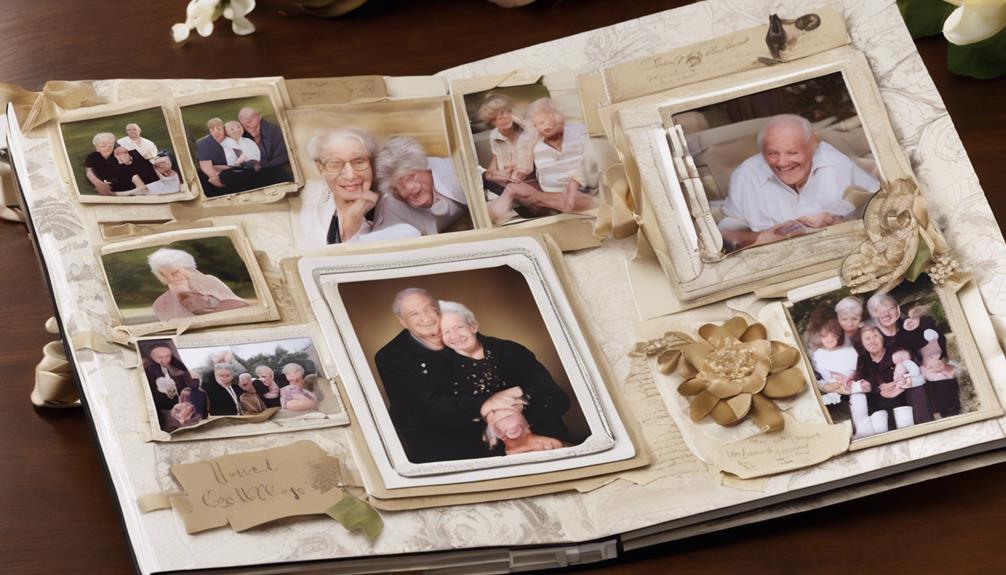
Let's now focus on personalizing the DVD to create a truly meaningful and engaging experience for your loved one living with dementia. When crafting the DVD for your loved one's journey down memory lane, consider these emotional touches:
- Selecting photos and videos that hold special memories can bring a sense of familiarity and comfort.
- Incorporating their favorite music won't only enhance the viewing experience but also help evoke cherished memories.
- Adding recorded messages or voiceovers can establish a personal connection and convey love and warmth.
- Organizing the content chronologically or by themes can help create a cohesive narrative that resonates with your loved one.
Editing and Finalizing
When finalizing the DVD for your loved one with dementia, ensure that the transitions, music, and effects are thoughtfully added to enhance their viewing experience. These elements can help create a seamless and engaging journey through the memories captured on the DVD. It's crucial to keep in mind that individuals living with Alzheimer's may have varying levels of cognitive abilities, so simplicity and clarity in editing are key.
As family members, we've the opportunity to create a personalized and meaningful viewing experience for our loved ones. By carefully arranging photos and videos in a coherent manner, we can help them follow along and connect with the content on a deeper level. Adding personalized touches like captions or recorded messages can also make the DVD more engaging and emotionally resonant.
Before finalizing the DVD, it's essential to double-check for any errors or inconsistencies. Ensuring that the menu is easy to navigate will make the viewing experience more enjoyable for your loved one. By putting in this extra effort during the editing and finalizing process, we can create a special keepsake that brings joy and comfort to our family member with dementia.
Frequently Asked Questions
How Can I Ensure That the DVD Will Be Easy for My Loved One With Dementia to Navigate and Use?
To ensure the DVD is easy for our loved one with dementia to use, let's keep it simple.
We should organize it into clear sections with large, easy-to-read labels. Using familiar pictures or symbols can also help them navigate.
Including familiar music or voices can provide comfort and aid in recognition.
Lastly, we can test the DVD with our loved one to make sure it's user-friendly and enjoyable for them to use.
Are There Any Copyright Issues I Need to Be Aware of When Selecting Content for the Dvd?
Absolutely, it's crucial to consider copyright issues when selecting content for the DVD. We must be mindful of using only materials that we've the rights to, to avoid any legal complications.
It's essential to prioritize the well-being of our loved one and ensure that the process of creating the DVD is done ethically and respectfully. Let's make sure we gather content that brings joy and comfort without infringing on any copyrights.
What Are Some Tips for Creating a Calming and Comforting Viewing Experience for My Loved One With Dementia?
Creating a calming and comforting viewing experience for our loved one with dementia involves selecting familiar, soothing content. Keep lighting soft, minimize background noise, and offer gentle reassurances throughout.
Incorporate favorite music or nature scenes to evoke positive emotions. Ensure the environment is cozy and free of distractions. Watching together can also provide a sense of security and connection.
These small adjustments can make a big difference in their overall well-being and enjoyment.
How Can I Involve Other Family Members in the Process of Creating the Dvd?
We can involve other family members in creating the DVD by assigning different tasks based on their strengths and interests. Some can gather photos, others can write heartfelt messages, and a few can help with editing. By sharing the workload, we ensure everyone contributes in a meaningful way.
Encouraging open communication and collaboration allows us to create a personalized and touching DVD that truly reflects our loved one's life and journey.
Are There Any Special Considerations I Need to Keep in Mind When Presenting the DVD to My Loved One With Dementia for the First Time?
When presenting the DVD to our loved one with dementia for the first time, we should create a calm and familiar environment.
It's important to be patient, allowing them time to process the information. Using gentle reminders about who's in the video and the memories shared can help orient them.
Keep the viewing session short to prevent overwhelming them. Remember, the goal is to bring joy and connection through the shared memories.
Conclusion
In conclusion, crafting a DVD for a loved one with dementia is a meaningful way to share memories and create moments of connection. By taking a trip down memory lane together, we can evoke emotions, spark recognition, and strengthen bonds that transcend time.
So why not take the time to preserve precious memories and create a lasting keepsake that will bring comfort and joy for years to come?
Albert brings a wealth of knowledge and expertise to our writing team. With a background in caregiving and a deep understanding of the challenges faced by caregivers, Albert’s writing resonates with authenticity and empathy. He is committed to delivering high-quality content that empowers and supports caregivers on their journey.
-

 Dementia Care1 week ago
Dementia Care1 week agoHow Gabapentin Affects Dementia: A Comprehensive Guide
-

 Dementia Care2 months ago
Dementia Care2 months agoUnderstanding the Stages of Vascular Dementia: A Visual Chart Guide
-

 Dementia Care1 week ago
Dementia Care1 week ago5 Things You Need to Know About Jack Nicholson’s Dementia
-

 Medication Management1 month ago
Medication Management1 month agoGabapentin Side Effects: Memory Loss Concerns?
-

 Palliative Care for Parkinson's2 weeks ago
Palliative Care for Parkinson's2 weeks agoPalliative Care for Parkinson’s: A New Hope for Patients”
-

 Dementia Care2 months ago
Dementia Care2 months agoUnderstanding Narcissism and Dementia: A How-To Guide
-

 Caregiving Issues4 weeks ago
Caregiving Issues4 weeks agoWhat Is Respite Care for Elderly?
-

 Palliative Care for Parkinson's2 weeks ago
Palliative Care for Parkinson's2 weeks agoUnlocking the Secrets of Palliative Care for Parkinson’s Disease
